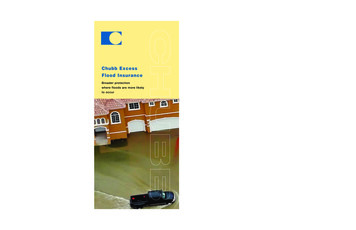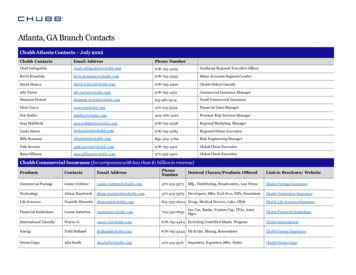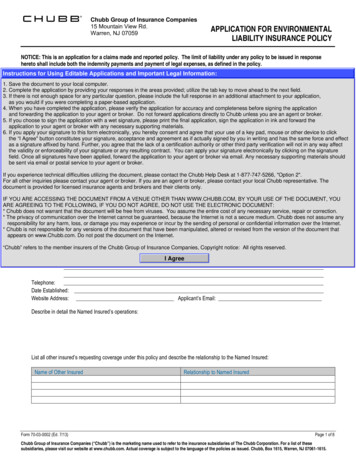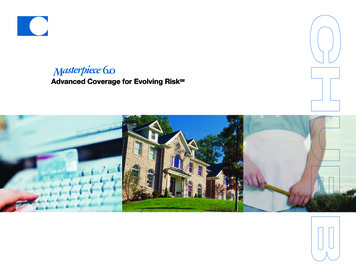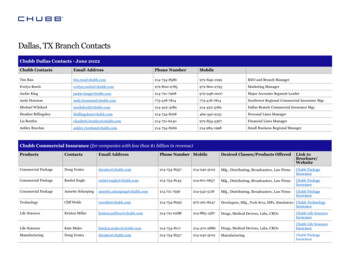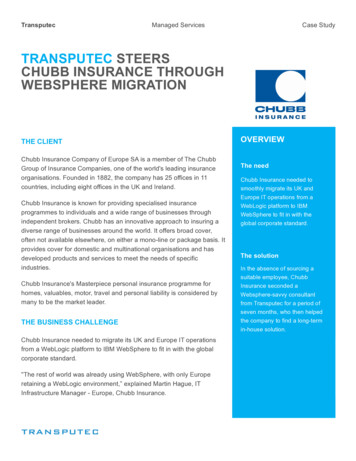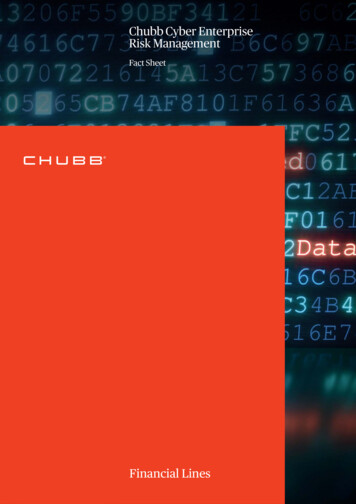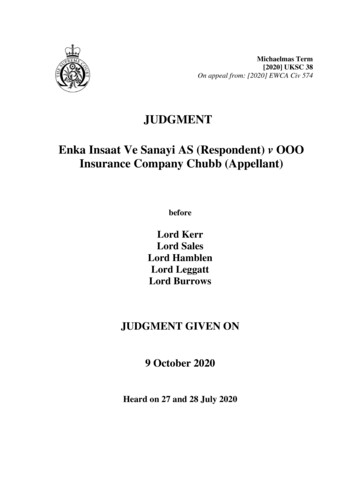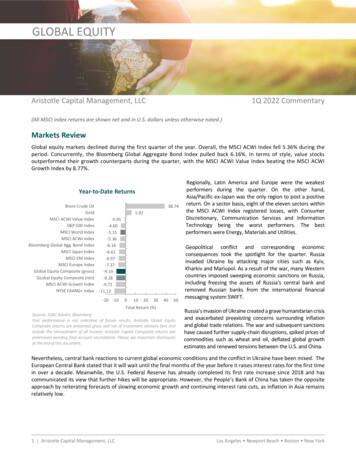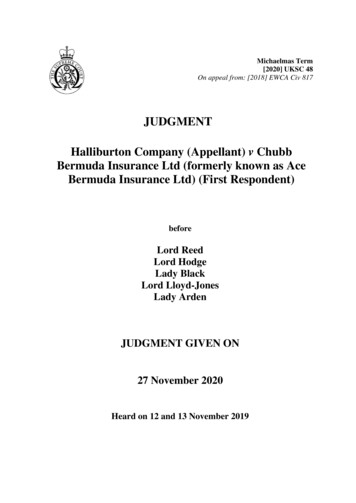
Transcription
Michaelmas Term[2020] UKSC 48On appeal from: [2018] EWCA Civ 817JUDGMENTHalliburton Company (Appellant) v ChubbBermuda Insurance Ltd (formerly known as AceBermuda Insurance Ltd) (First Respondent)beforeLord ReedLord HodgeLady BlackLord Lloyd-JonesLady ArdenJUDGMENT GIVEN ON27 November 2020Heard on 12 and 13 November 2019
AppellantLord Grabiner QCNeil Kitchener QCOwain Draper(Instructed by K & LGates LLP (London))1st RespondentMichael Crane QCToby Landau QCDavid Scorey QCDavid Peters(Instructed by Clyde & CoLLP)1st IntervenerConstantine Partasides QCMaanas JainNicola Peart(Instructed by ThreeCrowns LLP (London))2nd IntervenerCharles Kimmins QCNigel Rawding QCLuke PearceOlivia Valner(Instructed by FreshfieldsBruckhaus Deringer LLP(London))3rd IntervenerLouis Flannery QCDuncan Bagshaw(Instructed by Mishcon deReya LLP (London))4th IntervenerNicholas Vineall QCAndrew Stevens(Instructed by HFW LLP(London))5th IntervenerChristopher Smith QC(Instructed by Gateley Plc(London))Interveners:(1)International Court of Arbitration of the International Chamber of Commerce(2)London Court of International Arbitration(3)Chartered Institute of Arbitrators(written submissions only)(4)London Maritime Arbitrators Association (written submissions only)(5)Grain and Feed Trade Association(written submissions only)
LORD HODGE: (with whom Lord Reed, Lady Black and Lord Lloyd-Jonesagree)1.It is axiomatic that a judge or an arbitrator must be impartial; he or she mustnot be biased in favour of or against any party in a litigation or reference. A judgeor arbitrator, who is not in fact subject to any bias, must also not give the appearanceof bias: justice must be seen to be done. This appeal is not concerned with anydeliberate wrongdoing or actual bias but with the circumstances in which anarbitrator in an international arbitration may appear to be biased. It raises importantquestions about the requirement that there be no apparent bias and the obligation ofarbitrators in international arbitrations to make disclosure.2.The appeal concerns an arbitration under a Bermuda Form liability policywhich arose out of the damage caused by the explosion and fire on the DeepwaterHorizon drilling rig in the Gulf of Mexico in 2010 when a well was being pluggedin the context of a temporary abandonment. That disaster gave rise to severalarbitrations between insured parties and insurers. The principal issues which areraised in this appeal are: (i) whether and to what extent an arbitrator may acceptappointments in multiple references concerning the same or overlapping subjectmatter with only one common party without thereby giving rise to an appearance ofbias, and (ii) whether and to what extent the arbitrator may do so without disclosure.3.I will therefore address first, the duty of impartiality in the context ofarbitration, secondly, whether an arbitrator is under a legal duty to disclose particularmatters, thirdly, how far the obligation to respect the privacy and confidentiality ofan arbitration constrains his or her ability to make disclosure, and fourthly, whethera failure to disclose such matters demonstrates a lack of impartiality. I then addressthe times at which (a) the duty of disclosure and (b) the possibility of bias fall to beassessed.4.The appellants (“Halliburton”) entered into a Bermuda Form liability policy(“the Policy”) with ACE Bermuda Insurance Ltd, which is now called ChubbBermuda Insurance Ltd (“Chubb”) in 1992 and the Policy was renewed annually.Chubb and the three arbitrators involved in the arbitration which I discuss below arethe defendants in this action to remove one of the arbitrators. But Chubb alonedefended the proceedings and appears as the respondent in this appeal. Because theappeal raises questions of law of general importance in the field of arbitration thiscourt allowed and received written and oral representations from the InternationalCourt of Arbitration of the International Chamber of Commerce (“ICC”) and theLondon Court of International Arbitration (“LCIA”) and written submissions fromPage 2
the Chartered Institute of Arbitrators (“CIArb”), the London Maritime ArbitratorsAssociation (“LMAA”) and the Grain and Feed Trade Association (“GAFTA”). Thecourt is very grateful to the interveners for their contribution to the clarification ofthe wider issues raised by this appeal.5.At first instance, the names of the parties to, and the arbitrators in, thearbitrations referred to in these proceedings were anonymised. In the judgmenthanded down by the Court of Appeal, the names of the parties to theHalliburton/Chubb arbitration were revealed and only the names of the arbitratorswere anonymised. During the hearing of this appeal, this court questioned the needfor and appropriateness of such anonymity once the names of the parties to thearbitration had been disclosed and gave the parties to these proceedings, includingthe arbitrators, an opportunity to make submissions on the issue.6.Arbitration in the United Kingdom is as a norm a private form of disputeresolution and both the arbitration and the arbitral award are not generally a matterof public record. In England and Wales, the rules of procedure (CPR rule 62.10)empower the court to order that a claim under the Arbitration Act 1996 (“the 1996Act”) or otherwise affecting arbitration proceedings or an arbitration agreement beheard in public or in private but create a norm that such claims are heard in private.The obligations of confidentiality which are usually imposed in arbitrationagreements are designed to protect the privacy of the parties to the arbitration andthe evidence led in arbitral hearings. But nobody has suggested any basis in thepublic interest for preserving the anonymity of the arbitrators themselves in achallenge of this nature. I am satisfied that the principle of open justice, which thiscourt discussed in Dring (on behalf of the Asbestos Victims Support Group) v CapeIntermediate Holdings Ltd [2019] UKSC 38; [2020] AC 629, paras 41-43, pointstowards disclosure. This court has emphasised the importance of avoidingincremental exceptions to the principle of open justice: Khuja v Times NewspapersLtd [2017] UKSC 49; [2019] AC 161, paras 12-14 per Lord Sumption; In re S (AChild) (Identification: Restrictions on Publication) [2004] UKHL 47; [2005] 1 AC593, para 29 per Lord Steyn, endorsing the warning of Lord Woolf MR in R v LegalAid Board, Ex p Kaim Todner [1999] QB 966, 977. The arbitrators in theHalliburton/Chubb arbitration were defendants in the action but understandably tookno part in the proceedings. The arbitrator, whose decisions are challenged in theseproceedings, Mr Kenneth Rokison QC has a long-established reputation for integrityand impartiality. But the protection of that reputation is not a sufficient ground foranonymity, particularly when the courts below have founded on that reputation intheir reasoning. In any event, the challenge in this case involves no assertion ofactual bias but relies entirely on an assertion of an objective appearance of bias. Iam satisfied that there are no good grounds for maintaining the anonymity of thearbitrators in this appeal.Page 3
Factual background7.BP Exploration and Production Inc (“BP”) was the lessee of the DeepwaterHorizon drilling rig. Transocean Holdings LLC (“Transocean”) owned the rig andhad contracted with BP to provide crew and drilling teams. Halliburton providedcementing and well-monitoring services to BP in relation to the temporaryabandonment and the plugging of the well.8.The blow out of the well caused extensive damage and loss of life. It resultedin numerous legal claims by the US Government and corporate and individualclaimants against BP, Halliburton and Transocean. The US Government claimedcivil penalties under federal statutes and the private claims for damages werepursued through a Plaintiffs’ Steering Committee (“PSC”). After a trial to determineliability, the Federal Court for the Eastern District of Louisiana in a judgmenthanded down on 4 September 2014 (“the Federal Judgment”) apportioned blamebetween the defendants as follows: BP 67%, Transocean 30%, and Halliburton 3%.9.Before the Federal Judgment was handed down, Halliburton settled the PSCclaims against it by paying approximately US 1.1 billion. Following that judgment,Transocean settled the PSC claims for about US 212m and paid civil penalties tothe US Government of about US 1 billion.10.Halliburton claimed against Chubb under the Policy but Chubb refused topay Halliburton’s claim, contending among other things that Halliburton’ssettlement was not a reasonable settlement and that Chubb had acted reasonably innot consenting to the settlement. Transocean made similar claims against its liabilityinsurers, including Chubb. Chubb contested Transocean’s claim against it onsubstantially the same grounds.11.Both Transocean and Halliburton had purchased liability insurance fromChubb on the Bermuda Form. The Bermuda Form policy was created in the 1980sto provide high excess commercial general liability insurance to companiesoperating in the United States after the market for such insurance collapsed in thatcountry. Bermuda Form policies usually contain a clause providing for disputes tobe resolved by arbitration. Bermuda Form arbitrations are ad hoc arbitrations whichare not subject to the rules of an arbitral institution. Transocean and Halliburton hadarranged liability insurance in layers and both had obtained cover for the top layerfrom Chubb. It appears that the material policy terms were the same. The Policy wasgoverned by the law of New York. The Policy contained a standard arbitrationclause which provided for arbitration in London by a tribunal of three arbitrators,one appointed by each party and the third by the two arbitrators so chosen. If theparty-appointed arbitrators could not agree on the appointment of the third arbitrator,Page 4
the High Court in London was to make the appointment. The arbitrators were todeliver the award within 90 days of the conclusion of the hearing. There was no rightof appeal from the award.12.Halliburton invoked the arbitration clause of the Policy and nominatedProfessor William W Park, Professor of Law at Boston University, USA, who is avery experienced arbitrator, as its party-appointed arbitrator on 27 January 2015.Chubb nominated Mr John D Cole, an accomplished US insurance executive,counsel and arbitrator as its party-appointed arbitrator. The nominated arbitratorswere not able to agree on the appointment of the third arbitrator as chairman. As aresult, after a contested hearing in the High Court in which each side put forwardseveral candidates, on 12 June 2015 Flaux J appointed Mr Rokison, who was one ofthe arbitrators whom Chubb had proposed to the court, as the third arbitrator.Halliburton’s main objection to Chubb’s candidates, including Mr Rokison, was thatthey were English lawyers and the Policy was governed by the law of New York butit also objected to the appointment of Mr Rokison as chair of the tribunal becauseinsurers had a practice of repeatedly appointing retired judges or QCs known tothem, such as Mr Rokison, as party-appointed arbitrators. Nonetheless, Halliburtondid not appeal against that order. I refer to this Halliburton/Chubb reference toarbitration as “reference 1”.13.Before he expressed his willingness to be appointed, Mr Rokison disclosedto Halliburton and the court that he had previously acted as an arbitrator in severalarbitrations in which Chubb was a party, including as a party-appointed arbitratornominated by Chubb, and that he was currently appointed as arbitrator in twopending references in which Chubb was involved. The High Court did not treat theseappointments as an impediment to his appointment in reference 1.14.Halliburton served its statement of claim in reference 1 on 18 September2015. Chubb served its statement of defence on 11 December 2015.15.In December 2015 Mr Rokison accepted appointment as an arbitrator byChubb in relation to an excess liability claim by Transocean arising out of the sameincident (“reference 2”). The appointment was made on behalf of Chubb by Clyde& Co, who were also Chubb’s solicitors in reference 1. Within Chubb, the samemanager, Mr Trimarchi, was responsible for monitoring the claims made by bothHalliburton and Transocean and took the decision to refuse the claims in each case.16.Before accepting appointment by Chubb in reference 2, Mr Rokisondisclosed to Transocean his appointment in reference 1 and in the other Chubbarbitrations which he had disclosed to Halliburton. Transocean did not object. ButPage 5
in an omission which is central to the disclosure issue in this appeal, Mr Rokisondid not disclose to Halliburton his proposed appointment by Chubb in reference 2.17.In August 2016 Mr Rokison accepted appointment in another arbitrationarising out of the Deepwater Horizon incident as a substitute arbitrator on the jointnomination of the parties in a claim made by Transocean against a different insureron the same layer of insurance as the claim in reference 2. I refer to this as “reference3”. Nobody disclosed this proposed appointment to Halliburton. This furtheromission also is a ground of the non-disclosure claim in this appeal but thesubmissions on this appeal have focused more on the non-disclosure of theappointment in reference 2.18.In references 2 and 3 there was a preliminary issue which was potentiallydispositive of the claims if the tribunal decided in favour of the insurers. The issuewas whether the fines and penalties which Transocean had paid to the USGovernment should be taken into account in the exhaustion of both the underlyinglayers of insurance and Transocean’s self-insured retention. This issue involved theconstruction of the relevant insurance policy on undisputed facts. The preliminaryissue was heard separately in each of those references during November 2016.19.On 10 November 2016 Halliburton discovered Mr Rokison’s appointment inreferences 2 and 3. Mr Thomas Birsic, an attorney at K & L Gates, Halliburton’s USlawyers, wrote to Mr Rokison on 29 November 2016 to raise its concerns. Hereferred to the International Bar Association Guidelines on Conflicts of Interest inInternational Arbitration (“the IBA Guidelines”), which, he stated, imposed on anarbitrator a continuing duty of disclosure of potential conflicts of interest inaccordance with the Orange List in those guidelines, and asked for confirmation ofthe fact of the two later appointments and an explanation of the failure to make priordisclosure of those appointments.20.Mr Rokison responded by email on 5 December 2016. He explained how hehad come to be appointed in the later references. He explained, and both parties haveaccepted his explanation as truthful, that he had not disclosed those appointments toHalliburton, because it had not occurred to him at the dates of those appointmentsthat he was under any obligation to do so under the IBA Guidelines. He stated thathe appreciated, with the benefit of hindsight, that it would have been prudent forhim to have informed Halliburton through its lawyers and apologised for not havingdone so. He explained that while the three references all arose out of the DeepwaterHorizon incident, the roles which Halliburton and Transocean had played had beenvery different. His involvement in the two Transocean arbitrations had beenconfined to two two-day hearings on the construction of the policy in which the onlyevidence had been about the circumstances in which the parties entered into therelevant insurance contracts. He stated his commitment to remain independent andPage 6
impartial and acknowledged the importance of both parties in an arbitration sharingconfidence that their dispute would be determined fairly on the evidence and the lawwithout bias. He concluded:“I do not believe that any damage has been done but, if yourclients remain concerned, I would be prepared to considertendering my resignation from my appointment in the twoTransocean cases if the results of the determination of thepreliminary issues of construction, which are likely to be issuedshortly, do not effectively bring them to an end.”21.Halliburton’s lawyer responded by repeating his concerns about MrRokison’s impartiality and calling for him to resign. But Chubb would not agree tohis resignation which, in its assessment, would cause the proposed hearing ofevidence in the arbitration to be postponed and thereby cause wasted costs and delay.Mr Rokison responded in an email of 15 December 2016 in which he stated that hesought to take into account his duty to both parties. He repeated his view that he hadnot breached the IBA Guidelines by a failure to disclose the later appointments butreferred to his earlier statement that with hindsight he accepted that it would havebeen prudent to have made disclosure to avoid any sense of lack of transparency onhis part. He repeated that in references 2 and 3 he had not learned anything aboutthe facts of the incident which was not public knowledge. But, recognising that itwas fundamentally important that both parties should have confidence in theimpartiality of the arbitral tribunal and in particular its chairman, he stated that, ifhe could decide the matter in accordance with his own self-interest, he would resign.Nonetheless, he owed duties to both parties to complete the task and would be inbreach of his duties if he resigned in the face of strong opposition from one party.He therefore proposed that the parties should concentrate on trying to agree upon amutually acceptable replacement chairman who would be available before thehearing in the arbitration (which was scheduled to start towards the end of January2017). If they could so agree, he would gladly resign. If they could not, he wouldhave to continue and leave it to the court to decide whether he should be removed.22.Halliburton responded by issuing a Claim Form in the High Court on 21December 2016 seeking an order under section 24(1)(a) of the 1996 Act that MrRokison be removed as an arbitrator. Halliburton then raised further questions aboutthe overlap between the references, to which Mr Rokison responded by email on 4January 2017, stating that he was not aware that there were any common issues.Halliburton’s lawyers in an email of 5 January 2017 asked Mr Rokison whether hehad seen any document in which Chubb or any other respondent in references 2 or3 had set out similar defences to those pleaded in reference 1. Mr Rokison did notreply to that enquiry. But on 10 January 2017 Chubb released to Halliburton thepleadings in reference 2 which revealed the substantial similarity in its defenceswhich I mentioned in para 10 above, which were challenges to the reasonablenessPage 7
of the settlement which Transocean had negotiated. In its pleaded defence inreference 2, Chubb had also advanced, as an additional defence, the issue ofconstruction of the policy which was the subject matter of the preliminary issuedetermination.23.Mr Justice Popplewell heard Halliburton’s application in the High Court on12 January 2017, in which Halliburton sought to have Mr Rokison replaced by SirStephen Tomlinson who had just retired from the Court of Appeal, and delivered ajudgment, which I discuss below, on 3 February 2017, dismissing the application.24.The hearing in reference 1, which included the adducing of evidence and themaking of legal submissions, took place between 27 January and 6 February 2017.25.On 1 March 2017 the tribunals in references 2 and 3 issued awards on thepreliminary issues of policy construction, deciding them in favour of Chubb and theother insurer. The tribunals held that because the fines did not count towards theexhaustion of Transocean’s self-insured retention, Transocean could not claim anindemnity under the relevant layer of insurance. The awards brought both referencesto an end, without either tribunal having to consider questions as to thereasonableness of Transocean’s settlement.26.On 5 December 2017 the tribunal in reference 1 issued its Final Partial Awardon the merits, deciding in Chubb’s favour. The award was signed by all threearbitrators, although Professor Park, the arbitrator whom Halliburton had appointed,qualified his signature of the award in “Separate Observations”. Professor Parkstated that he had signed the award to confirm his participation but that he wasunable to join in the award as a result of his “profound disquiet about thearbitration’s fairness”. He explained that:“ arbitrators who decide cases cannot ignore the basicfairness of proceedings in which they participate. One sidesecured appointment of its chosen candidate to chair this case,over protest from the other side. Without any disclosure, theside that secured the appointment then named the sameindividual as its party-selected arbitrator in another disputearising from the same events. The lack of disclosure, whichcauses special concern in the present fact pattern, cannot besquared with the parties’ shared ex ante expectations aboutimpartiality and even-handedness.”Page 8
The other arbitrators, Mr Rokison and Mr Cole, responded to the separateobservations, stating that they did not regard them as being part of the tribunal’saward so as to render it a majority award. This was because those observations didnot contain any opinion dissenting from any part of the award, which containedfindings of fact, statements of applicable law, the process of reasoning and the finalconclusions drawn from that reasoning.27.It appears from Chubb’s written case and Mr Birsic’s second witnessstatement that Halliburton appointed Professor Park as its party-appointed arbitratorin three references against different insurers in insurance claims arising out of theDeepwater Horizon disaster, without formal disclosure. But K & L Gates suggest,in Mr Birsic’s second witness statement, that their proposal, which they made whenthey requested the arbitration and nominated Professor Park, that the arbitrations beconsolidated revealed the multiple nominations. Mr Birsic also suggests that the factthat Professor Park was a party-appointed arbitrator rather than a chair or umpire isa significant distinction from Mr Rokison’s position. I will return to the questionwhether that distinction is legally relevant in English law in my discussion below.Halliburton’s pleaded case28.In its claim Halliburton sought the removal of Mr Rokison as arbitrator inreference 1 and the appointment of another arbitrator to chair the tribunal in hisplace. The grounds for the claim were that circumstances existed that gave rise tojustifiable doubts as to his impartiality and in particular (i) his acceptance of theappointments by Clyde & Co in references 2 and 3 and his failure to notifyHalliburton or give it the opportunity to object and (ii) his offer to resign from thetribunal in reference 1 but Chubb’s refusal to permit him to do so.The judgments at first instance and in the Court of Appeal29.In his judgment of 3 February 2017 ([2017] EWHC 137 (Comm); [2017] 1WLR 2280) Popplewell J addressed the three elements of Mr Rokison’s conductwhich were said to give rise to the appearance of bias. The first was his acceptanceof the appointments in the Transocean arbitrations in references 2 and 3. The judgerejected the contention that the arbitrator would derive a secret benefit in the formof remuneration which he would receive from the arbitrations. In English law,arbitrators were under a duty to act independently and impartially and owed noallegiance to the party which appointed them. This principle was enshrined insection 33 of the 1996 Act. He also rejected the contention that the overlap betweenthe references was a concern because the arbitrator would learn information in theTransocean references which was relevant to the issues in reference 1 and thatinformation would be available to Chubb but not to Halliburton. He observed that itPage 9
was a regular feature of international arbitration that the same underlying subjectmatter gives rise to more than one claim and more than one arbitration withoutidentity of parties. It was common for arbitrators with the relevant expertise to sit indifferent arbitrations arising out of the same factual circumstances or subject matter.It was desirable that arbitrators be able to do so for three reasons. First, arbitrationwas a consensual process allowing parties to appoint their chosen arbitrators inaccordance with the procedures set out in their contract. Secondly, the parties to anarbitration often wished their tribunal to have particular knowledge and expertise inthe law and practices of the businesses and market in which the parties operated.Thirdly, the 1996 Act sought speedy finality, which was served when the tribunalwas already familiar with the background to and uncontroversial aspects of thesubject matter of the dispute.30.The judge considered that as a general rule the fact that an arbitrator may beinvolved in an arbitration between party A and party B, whose subject matter wasidentical to that in an arbitration between party B and party C did not preclude himor her from sitting on both tribunals. This was because an arbitrator in English lawwas required to decide the case by reference to the material available to the partiesto the particular reference: section 33 of the 1996 Act. He concluded hisconsideration of element 1 in these terms (para 29):“The informed and fair-minded observer would not thereforeregard [Mr Rokison] as unable to act impartially in thereference between [Halliburton] and [Chubb] merely by virtueof the fact that he might be an arbitrator in other referencesarising out of the incident, and might hear different evidence orargument advanced in another such reference. The objectiveand fair-minded assessment would be that his experience andreputation for integrity would fully enable him to act inaccordance with the usual practice of London arbitrators infulfilling his duties under section 33 by approaching theevidence and argument in the [Halliburton] reference with anopen mind; and in deciding the case, in conjunction with theother members of the tribunal, in accordance with suchmaterial, with which [Halliburton] will have a full and fairopportunity to engage.”31.Popplewell J also rejected a submission that the chairman of a tribunal hadan enhanced duty to maintain demonstrable impartiality as the ultimate guarantor offairness and impartiality. This submission, he opined, misunderstood the Englishlaw of arbitration which required all arbitrators, including party-appointedarbitrators, to maintain the same high standards of impartiality. The judge did notthink that there was a risk of the tribunal in reference 1 having to address issueswhich arose in references 2 and 3 if the preliminary issues in the latter referencesPage 10
were decided in the insurers’ favour. If the tribunals’ determinations of thepreliminary issues in those references went against the insurers, there was very littlerisk of overlap because (i) the issue of the reasonableness of Halliburton’s settlementwas legally and factually distinct from that of Transocean’s settlement as the twocompanies had played different roles on the rig, were alleged to have committeddifferent breaches of duty and had reached different settlements and (ii) Mr Rokisonhad offered to resign from the Transocean references if the preliminary issue wereresolved against the insurers.32.On element 2, which was the alleged failure to disclose the appointments toHalliburton, the judge held that, because of his conclusion on element 1 that thecircumstances did not give rise to any justifiable concerns about the arbitrator’simpartiality, there was nothing which had to be disclosed. Even if the disclosureought to have been made, the failure did not give rise to a real possibility of apparentbias against Halliburton because Mr Rokison’s explanation in correspondence,which was not challenged, was that it did not occur to him that he was under a dutyto do so. Even if that honest belief were mistaken, it did not raise a real possibilityof apparent bias. The judge also rejected element 3, which was Mr Rokison’sresponse to Halliburton’s challenge to his impartiality. Popplewell J discussed andrejected each of the complaints about that response, commenting that Mr Rokisonhad dealt with the challenge, which the judge said had included a “grossly offensive”suggestion, in a courteous, temperate and fair way which demonstrated his evenhandedness.33.Halliburton sought and obtained permission to appeal from Popplewell J andrenewed its challenge on appeal to the Court of Appeal in a hearing on 7 February2018. The Court of Appeal (Sir Geoffrey Vos C, Simon and Hamblen LJJ) dismissedthe appeal in a judgment dated 19 April 2018 ([2018] EWCA Civ 817; [2018] 1WLR 3361).34.In the Court of Appeal Halliburton did not challenge Popplewell J’s summaryof the relevant legal principles in para 16 of his judgment but suggested, and thecourt accepted, that, in assessing whether there was a real possibility that the tribunalwas biased, regard should be had to the risk of unconscious bias. The question forthe Court of Appeal was the application of those principles to the facts of the case.35.The first issue which the Court of Appeal addressed was the same issue asissue 1 in this appeal, namely whether and to what extent an arbitrator may acceptappointments in multiple references concerning the same or overlapping subjectmatter with only one common party without thereby giving rise to the appearanceof bias. The court recognised that the existence of appointments in such relatedarbitrations could cause the party which was not involved in the related arbitrationsto be concerned and could be a good reason for a judge to decline to appoint a personPage 11
as an arbitrator in the exercise of powers under section 18 of the 1996 Act in theface o
Halliburton Company (Appellant) v Chubb Bermuda Insurance Ltd (formerly known as Ace Bermuda Insurance Ltd) (First Respondent ) before . Lord Reed . Lord Hodge . Lady Black . Lord Lloyd-Jones Lady Arden . JUDGMENT GIVEN ON 27 November 2020 Heard on 12 and 13 November 2019.
